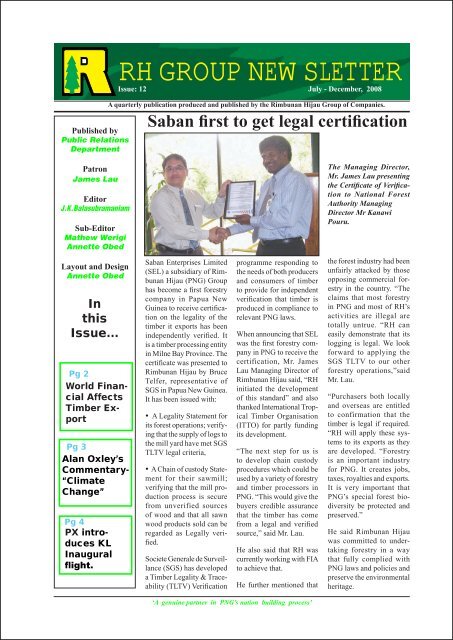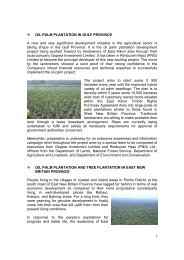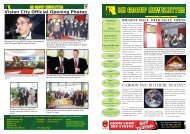Saban first to get legal certification - Rimbunan Hijau (PNG)
Saban first to get legal certification - Rimbunan Hijau (PNG)
Saban first to get legal certification - Rimbunan Hijau (PNG)
Create successful ePaper yourself
Turn your PDF publications into a flip-book with our unique Google optimized e-Paper software.
Published by<br />
Public Relations<br />
Department<br />
Patron<br />
James Lau<br />
Edi<strong>to</strong>r<br />
J.K.Balasubramaniam<br />
Sub-Edi<strong>to</strong>r<br />
Mathew Werigi<br />
Annette Obed<br />
Layout and Design<br />
Annette Obed<br />
In<br />
this<br />
Issue...<br />
Pg 2<br />
World Financial<br />
Affects<br />
Timber Exportports.<br />
Pg 3<br />
Alan Oxley’s<br />
Commentary-<br />
“Climate<br />
Change”<br />
Pg 4<br />
PX introduces<br />
KL<br />
Inaugural<br />
flight.<br />
RH GROUP NEWSLETTER<br />
Issue: 12 July - December, 2008<br />
A quarterly publication produced and published by the <strong>Rimbunan</strong> <strong>Hijau</strong> Group of Companies.<br />
<strong>Saban</strong> <strong>first</strong> <strong>to</strong> <strong>get</strong> <strong>legal</strong> <strong>certification</strong><br />
<strong>Saban</strong> Enterprises Limited<br />
(SEL) a subsidiary of <strong>Rimbunan</strong><br />
<strong>Hijau</strong> (<strong>PNG</strong>) Group<br />
has become a <strong>first</strong> forestry<br />
company in Papua New<br />
Guinea <strong>to</strong> receive <strong>certification</strong><br />
on the <strong>legal</strong>ity of the<br />
timber it exports has been<br />
independently verified. It<br />
is a timber processing entity<br />
in Milne Bay Province. The<br />
certificate was presented <strong>to</strong><br />
<strong>Rimbunan</strong> <strong>Hijau</strong> by Bruce<br />
Telfer, representative of<br />
SGS in Papua New Guinea.<br />
It has been issued with:<br />
• A Legality Statement for<br />
its forest operations; verifying<br />
that the supply of logs <strong>to</strong><br />
the mill yard have met SGS<br />
TLTV <strong>legal</strong> criteria,<br />
• A Chain of cus<strong>to</strong>dy Statement<br />
for their sawmill;<br />
verifying that the mill production<br />
process is secure<br />
from unverified sources<br />
of wood and that all sawn<br />
wood products sold can be<br />
regarded as Legally verified.<br />
Societe Generale de Surveillance<br />
(SGS) has developed<br />
a Timber Legality & Traceability<br />
(TLTV) Verification<br />
programme responding <strong>to</strong><br />
the needs of both producers<br />
and consumers of timber<br />
<strong>to</strong> provide for independent<br />
verification that timber is<br />
produced in compliance <strong>to</strong><br />
relevant <strong>PNG</strong> laws.<br />
When announcing that SEL<br />
was the <strong>first</strong> forestry company<br />
in <strong>PNG</strong> <strong>to</strong> receive the<br />
<strong>certification</strong>, Mr. James<br />
Lau Managing Direc<strong>to</strong>r of<br />
<strong>Rimbunan</strong> <strong>Hijau</strong> said, “RH<br />
initiated the development<br />
of this standard” and also<br />
thanked International Tropical<br />
Timber Organisation<br />
(ITTO) for partly funding<br />
its development.<br />
“The next step for us is<br />
<strong>to</strong> develop chain cus<strong>to</strong>dy<br />
procedures which could be<br />
used by a variety of forestry<br />
and timber processors in<br />
<strong>PNG</strong>. “This would give the<br />
buyers credible assurance<br />
that the timber has come<br />
from a <strong>legal</strong> and verified<br />
source,” said Mr. Lau.<br />
He also said that RH was<br />
currently working with FIA<br />
<strong>to</strong> achieve that.<br />
He further mentioned that<br />
‘A genuine partner in <strong>PNG</strong>’s nation building process’<br />
The Managing Direc<strong>to</strong>r,<br />
Mr. James Lau presenting<br />
the Certificate of Verification<br />
<strong>to</strong> National Forest<br />
Authority Managing<br />
Direc<strong>to</strong>r Mr Kanawi<br />
Pouru.<br />
the forest industry had been<br />
unfairly attacked by those<br />
opposing commercial forestry<br />
in the country. “The<br />
claims that most forestry<br />
in <strong>PNG</strong> and most of RH’s<br />
activities are il<strong>legal</strong> are<br />
<strong>to</strong>tally untrue. “RH can<br />
easily demonstrate that its<br />
logging is <strong>legal</strong>. We look<br />
forward <strong>to</strong> applying the<br />
SGS TLTV <strong>to</strong> our other<br />
forestry operations,”said<br />
Mr. Lau.<br />
“Purchasers both locally<br />
and overseas are entitled<br />
<strong>to</strong> confirmation that the<br />
timber is <strong>legal</strong> if required.<br />
“RH will apply these systems<br />
<strong>to</strong> its exports as they<br />
are developed. “Forestry<br />
is an important industry<br />
for <strong>PNG</strong>. It creates jobs,<br />
taxes, royalties and exports.<br />
It is very important that<br />
<strong>PNG</strong>’s special forest biodiversity<br />
be protected and<br />
preserved.”<br />
He said <strong>Rimbunan</strong> <strong>Hijau</strong><br />
was committed <strong>to</strong> undertaking<br />
forestry in a way<br />
that fully complied with<br />
<strong>PNG</strong> laws and policies and<br />
preserve the environmental<br />
heritage.
TIMBER EXPORTS AFFECTED BY GLOBAL FINANCIAL CRISIS<br />
The global financial crisis is unprecedented even ordinary<br />
citizens don’t understand what is playing out these days on<br />
the international financial market. Even the bankers and<br />
financiers are finding themselves in a state of shock.<br />
The collapse which began in July with the US mortgage<br />
crisis and in the following month led in<strong>to</strong> an international<br />
credit crunch is proceeding inexorably and encompassing<br />
all sections of the financial and economic system. Around<br />
the world s<strong>to</strong>ck markets have collapsed or been bought<br />
out, and governments in even wealthiest nations have had<br />
<strong>to</strong> come up with rescue package <strong>to</strong> bail out their financial<br />
systems. This has already affected the livelihoods if almost<br />
everyone in an increasingly inter-connected world.<br />
As a consequence of the global financial melt down, major<br />
mining companies in Australia like Xstra, Oz minerals have<br />
began laying of more than 500 workers and Rio Tin<strong>to</strong> mentioned<br />
<strong>to</strong> cut 15,000 jobs world wide. Even richest Arabs<br />
are <strong>get</strong>ting poorer, the Saudis Prince Alwaleed bin Tala one<br />
of the richest billionaires’ investments shivered nearly 20<br />
percent, and governments of the oil rich Gulf countries say<br />
the crisis knocked down nearly 350 billion dollars from<br />
the capitalization of their markets this year.<br />
Papua New Guinea is no exception; since the world is<br />
inter-connected we have our own experiences related <strong>to</strong><br />
the current global crisis.<br />
This has triggered the increase of prices of basic goods<br />
like rice and tinned fish and even prices for garden food<br />
at the local markets have doubled or tripled. Inflationary<br />
pressure remain large as the world oil price is still at a<br />
high level which we have experienced a sharp increase<br />
in fuel prices.<br />
Overall, the tropical timber trade slumped due <strong>to</strong> weak<br />
global economic conditions and low demand ahead of the<br />
Christmas and New Year’s holiday.<br />
As exporters searched <strong>to</strong> boost exports in 2009, Malaysian<br />
2<br />
Highlights of the TLTV<br />
Programme Certificate<br />
Presentation <strong>to</strong><br />
<strong>Saban</strong> Enterprise, a<br />
subsidiary of <strong>Rimbunan</strong><br />
<strong>Hijau</strong> Group of<br />
Companies.<br />
The ceremony was attended<br />
by members<br />
of the Forest Authority,<br />
representatives of<br />
the New Zealand and<br />
Australian High Commissions.<br />
‘A genuine partner in <strong>PNG</strong>’s nation building process’<br />
traders were hopeful that markets in the Middle East, such<br />
as those in Saudi Arabia, and more positive production<br />
trends in China would boost demand for their products. The<br />
global crises have forced the demand for timber <strong>to</strong> be sluggish<br />
like in Congo and other timber producing nations.<br />
In Papua New Guinea, the demand for timber decreased<br />
compared <strong>to</strong> last year because:<br />
> Delay in start up of new projects, 2 and possibly 3 large<br />
FMA projects were the tar<strong>get</strong>.<br />
> Rising costs, especially fuel, and supply delays for equipment<br />
and parts, building materials are having impacts.<br />
It has been predicted that the condition will worsen and<br />
continue till next year, the slow down in export markets<br />
as buyers become more cautious and also as building and<br />
construction sec<strong>to</strong>rs slow down in our markets in Australia<br />
and New Zealand. Given the current uncertainties there is<br />
more downside risks than positive trends emerging.<br />
An aerial view of the City of Port Moresby, capital of<br />
Papua New Guinea.
An Unlikely Solution For Climate Change<br />
Building forests offsets emissions without hurting industry.<br />
http://www.forbes.com/2008/12/22/climate-change-forest-oped-cx_ao_1222oxley<br />
Tucked away in a voluminous assessment released last year<br />
by the United Nation’s Intergovernmental Panel on Climate<br />
Change (IPCC), there’s an incredibly cost-effective way<br />
<strong>to</strong> reduce greenhouse gas emissions.<br />
It’s in the chapter on forestry.<br />
Given the global economic crisis, the cost of “going green”<br />
is—not surprisingly—becoming an increasingly prominent<br />
fac<strong>to</strong>r as international regula<strong>to</strong>rs consider drafting environmental<br />
policies. This shift in priorities was evident in<br />
the latest round of U.N. climate talks, which ended last<br />
Friday in Poland.<br />
After two weeks of negotiation, it looked as if participants<br />
were no closer <strong>to</strong> consensus on the terms of the treaty<br />
that will replace the expiring Kyo<strong>to</strong> Pro<strong>to</strong>col, the 1992<br />
agreement that requires most developed nations <strong>to</strong> reduce<br />
their carbon emissions. Issues of cost are one of the main<br />
reasons for this stalemate on emissions caps. One solution?<br />
Build new forests.<br />
The IPCC report notes that if governments worked <strong>to</strong><br />
exploit the natural capacity of forests <strong>to</strong> absorb carbon<br />
dioxide—and deliberately aimed <strong>to</strong> increase that sink—as<br />
much as 40 <strong>to</strong> 50% of human carbon emissions could be<br />
offset. That’s remarkable. But even more as<strong>to</strong>unding is<br />
the fact that this extraordinary possibility has been largely<br />
ignored.<br />
Instead, the Worldwide Fund for Nature (WWF), Greenpeace<br />
and the European Commission have sought <strong>to</strong> join<br />
their long-standing campaign <strong>to</strong> halt commercial forestry<br />
worldwide with any new global contract <strong>to</strong> halt emissions.<br />
These organizations argue that, if developing countries<br />
in tropical regions cease harvesting natural forests for<br />
lumber and other resources, emissions will be reduced by<br />
around 20%.<br />
But this result is less than ideal. As the IPCC report<br />
shows, the alternative—<strong>to</strong> actively build forests worldwide—would<br />
more than double that rate of absorption<br />
and do so at lower cost.<br />
According <strong>to</strong> the Food and Agricultural Organization<br />
(FAO), most forest land in these countries is cleared <strong>to</strong> free<br />
up land for agricultural production, create living space or <strong>to</strong><br />
Alan Oxley is chairman of World Growth<br />
International, a U.S.-based free market nongovernmental<br />
organization, and the author of a<br />
new report on how forestry can combat climate<br />
change while bolstering the economy.<br />
‘A genuine partner in <strong>PNG</strong>’s nation building process’<br />
obtain wood for fuel. By imposing blanket restrictions on<br />
deforestation, Western groups like WWF and Greenpeace<br />
are sentencing developing nations <strong>to</strong> a drop in their food<br />
supplies as well as stunted economic development.<br />
This kind of collateral damage exposes one of the subtle<br />
downsides of the Kyo<strong>to</strong> Pro<strong>to</strong>col. As the WWF noted in<br />
a recent report, green activists don’t embrace strategies<br />
like forestry regrowth, which expand carbon offsets. Even<br />
though this kind of initiative often offers the best benefits<br />
for both the environment and the economy, environmental<br />
groups are often reluctant <strong>to</strong> consider them because they<br />
ease the pressure on business and industry <strong>to</strong> reduce emissions<br />
by other means—like switching away from fossil<br />
fuels as a source of energy.<br />
In other words, green activists aren’t motivated purely<br />
<strong>to</strong> reduce emissions; they’re also angling <strong>to</strong> close down<br />
traditional energy industries. And if the poor <strong>get</strong> hurt in the<br />
process, it would seem the end justifies the means.<br />
But the economic crisis changed all that and rendered these<br />
ulterior political motives unrealistic. Now it’s not just the<br />
economic well-being of people in developing nations that’s<br />
at risk from anti-industry climate policies.<br />
Apprehension is also growing among Italians and Germans.<br />
Their leaders worry that local companies will not<br />
be able <strong>to</strong> bear the heavy costs of the low emission tar<strong>get</strong>s<br />
the European Union plans <strong>to</strong> set in a new agreement. Pressure<br />
from German business and unions has forced German<br />
Chancellor Angela Merkel, one of the architects of the<br />
Kyo<strong>to</strong> Pro<strong>to</strong>col, <strong>to</strong> put her country’s economic interest<br />
ahead of green ideals.<br />
With businesses and families alike facing a shortage of<br />
cash, it’s time <strong>to</strong> consider expanding carbon offsets. That<br />
means seriously considering the significant role sustainable<br />
forestry stands <strong>to</strong> play in the fight against climate<br />
change.<br />
In the words of President-elect Barack Obama, “The<br />
time for change has come.” And when it comes <strong>to</strong> global<br />
negotiations on climate change, that change will mean<br />
measuring the effectiveness of green initiatives by their<br />
benefit <strong>to</strong> both the environment and the economy.<br />
3
SECURITY OFFICER<br />
AWARDED BRAVERY<br />
CERTIFICATE<br />
Kini Vere one of our Senior<br />
Security Officers<br />
with the Dynasty Security<br />
was awarded a Bravery<br />
Certificate in recognition<br />
for his bravery <strong>to</strong> save his<br />
colleagues.<br />
In the early hours of 14<br />
November 2008, three<br />
armed men entered our<br />
office premises and pointed<br />
a gun at him, he had<br />
no choice but <strong>to</strong> jump<br />
over razor wired fence<br />
in order <strong>to</strong> raise an alarm<br />
<strong>to</strong> the police or public.<br />
In the process he landed<br />
on the concrete wall and<br />
injured his right foot. The<br />
three culprits also jumped<br />
over the fence, followed<br />
him and fought with him.<br />
Luckily other securities<br />
from other nearby premises<br />
came <strong>to</strong> his assistance<br />
and the men fled.<br />
He is currently on sick<br />
leave and will resume<br />
after his foot is well. He<br />
has also received praise,<br />
in the process he saved<br />
other security guards as<br />
the men concentrated on<br />
him instead of attacking<br />
others.<br />
Kini with his injured<br />
foot.<br />
PX Starts KL Flight<br />
Pictured above is Air Niugini Chairman speaking at the<br />
background with Mr James Lau and Moniusha one of<br />
the youngest passengers <strong>to</strong> board the <strong>first</strong> direct flight <strong>to</strong><br />
Kuala Lumpur.<br />
The National flag carrier, Air Niugini has launched its<br />
direct flight <strong>to</strong> Kuala Lumpur Malaysia on the 29th of<br />
Oc<strong>to</strong>ber 2008. That was Air Niugini’s 10th international<br />
destination apart from Cairns, Brisbane, Sydney, Singapore,<br />
Hong Kong, Manila, Narita, Honiara and Nadi.<br />
According <strong>to</strong> the Air Niugini board Chairman Sir James<br />
Tjoeng the non-s<strong>to</strong>p KL flight will address the demand for<br />
huge Malaysian business presence in Papua New Guinea.<br />
The Port Moresby – Kuala Lumpur (PX 394) service departs<br />
Port Moresby every Wednesdays at 3pm and arrives<br />
at Kuala Lumpur at 7:10pm local time. The return flight<br />
(PX 395) departs Kuala Lumpur at 8:10pm and arrives in<br />
Port Moresby at 4:20am on Thursdays.<br />
For Malaysians, this service will greatly ease the burden<br />
of transiting from Singapore like before, especially during<br />
early hours of the morning. Sir James Tjoeng and<br />
Air Niugini Chief Executive Officer Wasantha Kumrasiri<br />
including Mr. James Lau Managing Direc<strong>to</strong>r of <strong>Rimbunan</strong><br />
<strong>Hijau</strong> joined the invited guests on the board the inaugural<br />
flight <strong>to</strong> Malaysia.<br />
2008 December 01st-Wear Red Day<br />
Group welcomes<br />
new Legal<br />
Officer<br />
New <strong>to</strong> our Legal Department<br />
is Samuel Clay<strong>to</strong>n Olewale<br />
from Kunini Village of<br />
Daru in the Western Province,<br />
who joined the Group<br />
on the 14th of Oc<strong>to</strong>ber 2008<br />
as a Legal Officer.<br />
Having started two months<br />
ago, he found the working<br />
environment welcoming<br />
and influential, giving him<br />
a sense of commitment and<br />
loyalty, especially with the<br />
Legal section.<br />
Samuel’s interest in working<br />
with <strong>Rimbunan</strong> <strong>Hijau</strong> developed<br />
due <strong>to</strong> the company’s<br />
diversification, its vastness<br />
and major developmental<br />
impacts in rural areas. He<br />
also wants <strong>to</strong> be part of a<br />
team in a company that is<br />
consistently expanding.<br />
Prior <strong>to</strong> working with us, he<br />
worked for Dirua Lawyers,<br />
Public Proseco<strong>to</strong>r’s Office,<br />
Mambei Lawyers and David<br />
Consultants.<br />
He said he was very privileged<br />
<strong>to</strong> be with our <strong>legal</strong><br />
team and the entire work<br />
force here at the head office<br />
and look forward in the<br />
years <strong>to</strong> come.<br />
We welcome your suggestions and contributions <strong>to</strong> improve our future publications, send them <strong>to</strong>:<br />
Public Relations Dept,<br />
Telephone: 325 7677 Email:<br />
RH (<strong>PNG</strong>) Group<br />
Facsimile: 325 6165 pr_dept@rhpng.com.pg<br />
P.O Box 102<br />
annette_pr@rhpng.com.pg<br />
Port Moresby<br />
werigi_pr@rhpng.com.pg<br />
National Capital District www. rhpng.com.pg<br />
‘A genuine partner in <strong>PNG</strong>’s nation building process’




